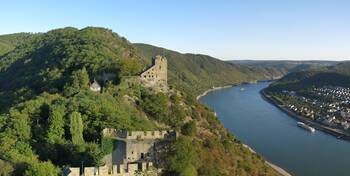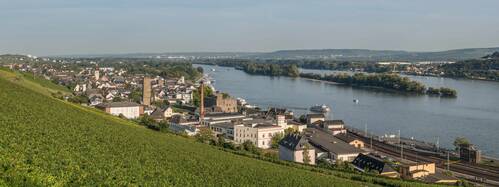5th Transnational Rhine Conference, Mainz 30.10-1.11.2014 at the Akademie der Wissenschaften und der Literatur Mainz
Amsterdam as an educator - or: The Rhine as the historic "axis of capitalism"

- The Rhine near Boppard[Bild: Jörg Braukmann [CC BY-SA 4.0]]
If there was anything like a historic geography of economic systems, the Rhineland – measured in the broadest sense from the South of England to Basel – would play an outstanding role. Without a doubt, this role would have much to do with what is already known about the importance of big rivers in economic history, making the Rhineland one example among several others. In analysing the reasons for the formation and expansion of economic systems, however, the Rhineland plays an outstanding role insofar as the course of the river, with its transportation function, can even be described as constituting an axis of new economic practices which, since the 19th century, we characterise as capitalistic. The Rhineland did not, thereby, play an homogenous role: instead, the Rhine served as an axis for the expansion of modern commercial forms and techniques leading to a shift in economic practices, be it in the manner and extent of agricultural and industrial production or the content and shape of consumption. However, the Rhine's material contributions are not even the crucial point. Rather, the expansion of new economic practices is far more decisive when considering the Rhine's importance. In attempting to understand economic development, it might be an exaggeration to declare the Rhine the "channel of modernisation", but it seems to be undeniable that capitalism found its way to continental Europe by using it.
The context for this historical importance does not lie in the river's history or function itself, but in the shift of the centres of the world economy from the late 14th century. The fact that, in the end, it was the cities from the greater, Rhine estuarial region which performed a central role in the world economy certainly has to do with their convenient location, but especially with the political and religious conflicts of the era (which are outside the scope of the present discussion). Following these developments, Antwerp and Amsterdam, later London, took over key functions which had previously been the preserve of Atlantic and Mediterranean coastal cities. The resulting increase in trade volume itself required essential alterations in the techniques of trade; above all however, the concentration of these techniques stimulated population growth, which again was of major importance for urban construction as well as income and consumption structures. In this way, Antwerp, later Amsterdam, and eventually London developed from knots within the trade flows to "modern" cities with huge populations, above-average income and differentiated structures of consumption. The development of the first capitalistic hotspots radiated outwards: the rapidly growing cities within the estuarial area were in need of workforces, building materials, agricultural products and, if available, luxury goods, not only to cover their own growing and increasingly differentiated needs, but also for overseas trade. In so far that they were reliant on their hinterland, and even dependent on it, available resources determined the cities' limits to growth. This applied to Antwerp and Amsterdam, and for the western German and Dutch areas, while London drew on major parts of England. The creation of centres, observable in detail from the 15th century, thus changed both centres and hinterlands at the same time; the Rhine's function as a way of transport and communication was, therefore, of major importance for the continent as a whole.

- Panoramic view of the Rhine at Rüdesheim[Bild: Jörg Braukmann [CC BY-SA 4.0]]
The 5th Rhine conference explores the growing interdependence and interconnectedness of centres and hinterlands, which essentially facilitates the expansion of capitalism. In doing so, it is less the material process of exchange on and with the Rhine as the focus, but more the structural change linked to it, and the way and fashion in which this exchange was handled. Analysing the historical processes at work gives rise to a host of questions, such as: What changes in workforce migration are observable, how were payment and working conditions organised? Which goods were traded, and in what manner, up and down the Rhine? Were there crucial changes in volume and, above all, how were the techniques of trade changing and what possible effects did they have on agriculture and industry along the Rhine? What new trading methods were advancing from Holland (technical, legal, financial, etc.)? How were new techniques and innovations incorporated? To what extent did this lead to differentiation - why did some industries adopt the changes whilst others rejected them? How was the supply of new colonial goods to the hinterland organised? Were Westphalian and Rhenish merchants buying directly in Holland? What kinds of cultural encounters did they experience and how did these experiences radiate out to their home territories? From literature we do know the fear of the "kalte Holländerei", "cold dutchness" (see Wilhelm Hauf, Das kalte Herz). Was the reality equivalent to this literary fear? Finally, how was the transforming Rhine economy with its strong adaptation of capitalistic practices changing the semantic structure of time? Was Holland the role model or the cautionary tale for the so called "bourgeois virtues"? How, in any case, were these virtues spread and communicated - were they some kind of "Chinese whispers" accompanying the intensifying migration streams or were they being imported on purpose, with Amsterdam acting as an educator? What effect did the Netherlands - with its displays of increasing affluence and Calvinistic self-staging - have on Lutheran and Catholic territories? To sum up, this conference focuses on the question of the relationship between the Rhine economy and the expansion of capitalistic economic practices with its multiple dimensions and perspectives.
From the outset five years ago, the organizers aimed to build a transnational network of scholars interested in the history of the Rhine. Initially consisting of scholars from countries along the Rhine and its delta, the Transnational Rhine Network gradually expanded to comprise scholars from all over the world, including Britain, Japan, and the US. The organizing committee has invited an international group of scholars to present their papers and others to discuss these. However, all those interested in participating in the discussion are encouraged to do so. For more information please contact Ben Wubs or Ralf Banken (email above).